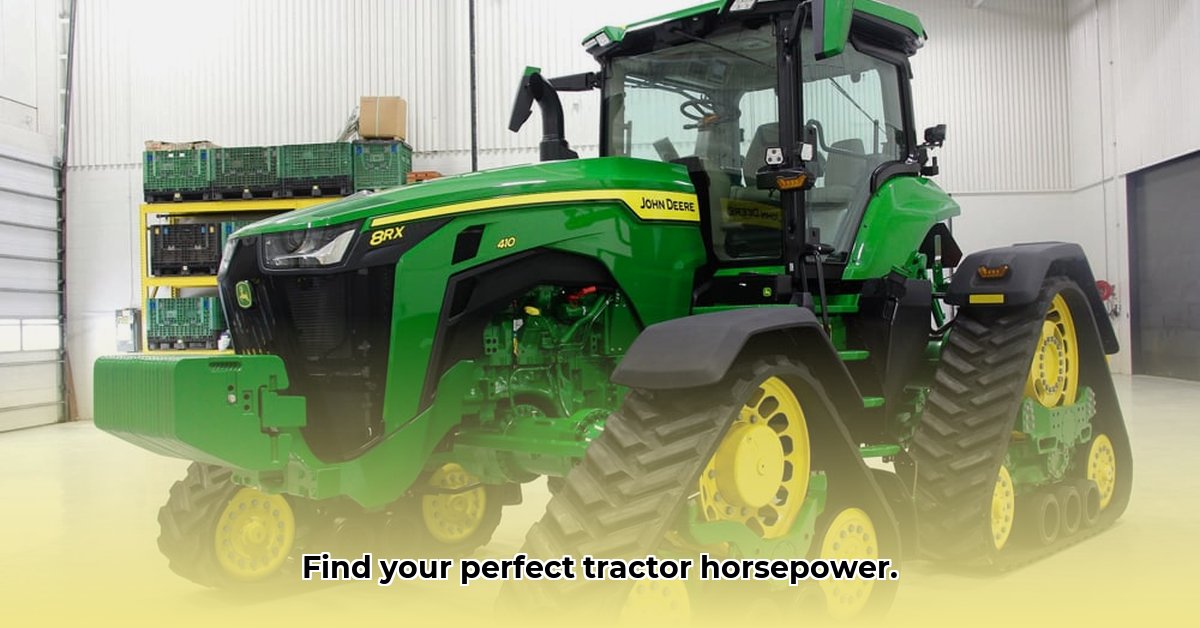
Choosing the right tractor horsepower (HP) is a critical decision for farmers aiming for sustainable and profitable operations. Finding the optimal balance between power and efficiency is key to minimizing fuel consumption, reducing soil compaction, and ultimately, protecting the environment. This article will guide you through the process of selecting a tractor that meets your farm's specific needs while promoting sustainable agricultural practices. For example, consider exploring options like 50 HP Mahindra tractors.
Understanding Your Farming Operation: Matching Tractor HP to Your Needs
Before even considering horsepower numbers, you must thoroughly assess your farm's unique characteristics. This crucial first step ensures you select a tractor that's neither underpowered nor excessively powerful.
- Analyze your workload: How many acres do you farm? How many hours per day will the tractor operate? A larger operation demands a more robust machine than a smaller one.
- Consider your equipment: The implements you use (plows, cultivators, planters) dictate the necessary horsepower. A heavy plow requires significantly more power than a light cultivator.
- Evaluate soil type: Heavy clay soils present a greater challenge than lighter, sandy soils. This impacts both tractor selection and tillage practices. Heavier soils require more horsepower to till effectively.
Failing to properly assess your needs can lead to purchasing a tractor that's either too powerful (wasting fuel) or too weak (reducing efficiency). A careful analysis is paramount.
The Power Equation: Tractor HP, Fuel Efficiency, and Your Bottom Line
Higher horsepower generally translates to higher fuel consumption—a significant concern for sustainable farming. However, advancements in tractor technology are substantially improving fuel efficiency. Modern tractors offer several features to minimize fuel use:
- High-efficiency engines: Modern diesel engines are designed for optimized combustion, maximizing work output per unit of fuel.
- Smart technology: Precision farming technologies, such as GPS guidance systems, minimize overlapping passes, reducing fuel waste. These systems optimize field coverage and minimize unnecessary fuel consumption.
- Efficient transmissions: Well-designed transmissions perfectly match engine speed to ground speed, preventing engine strain and fuel waste. This is akin to having cruise control for your farm equipment.
Lower fuel consumption directly translates to lower costs for farmers and a reduced environmental footprint. Consider fuel economy as a key factor in your decision-making process. Isn't it logical to seek out fuel-efficient models to reduce your operational expenses?
Specialty Tractors: Tailoring Your Tractor HP to the Job
Precision agriculture has led to a wider array of specialty tractors for specific tasks, each offering unique advantages in terms of efficiency and environmental impact.
| Tractor Type | Ideal Applications | Key Advantages |
|---|---|---|
| Narrow-track tractors | Vineyards, orchards, row crops | Reduced soil compaction, improved maneuverability in tight spaces |
| High-clearance tractors | Hayfields, row crops | Prevents crop damage, enhances efficiency |
| Low-profile tractors | Greenhouses, hydroponic farming | Suitable for low-clearance environments |
Consider the specific requirements of your farming operation; the right specialized tractor significantly improves efficiency and minimizes environmental impact.
Sustainability in Action: Minimizing Environmental Impact
A tractor's horsepower significantly impacts the environment. Heavy tractors compact soil, especially in wet conditions. This reduces water infiltration and harms plant growth. Implementing sustainable practices such as controlled traffic farming (driving only on designated paths) and adjusting tire pressure to minimize compaction can partially mitigate this issue.
Remember, sustainable farming encompasses the entire farming system; the tractor is merely one component. Adopting sustainable practices in conjunction with your suitable tractor choice is vital for long-term success.
Making the Right Choice: A Balanced Approach
Selecting the right tractor horsepower requires careful planning and consideration. Don't simply opt for the most powerful option; prioritize efficiency and sustainability.
- Efficiency: How much work can be accomplished with a given amount of fuel?
- Fuel economy: This directly impacts your costs and environmental impact.
- Farm-specific needs: This is the most crucial factor.
Finding the optimal balance between productivity and sustainability ensures a profitable and environmentally responsible future for your farm. Choosing wisely today is an investment in tomorrow's success.
How to Choose Fuel-Efficient Tractors for Sustainable Farming
Key Takeaways:
- Fuel efficiency is paramount for sustainable farming, reducing costs and environmental impact.
- Tractor size and weight directly affect soil compaction; careful selection is crucial.
- Versatile attachments enhance adaptability for diverse sustainable practices.
- Consider compact tractors for smaller farms, emphasizing fuel economy. Larger operations may need greater power but can utilize technology to compensate.
- Explore alternatives like biodiesel or electric tractors, evaluating local availability and infrastructure.
- Soil type and terrain affect tire size and weight distribution.
- Regular maintenance significantly improves fuel efficiency.
- Government subsidies and incentives can make sustainable equipment more accessible.
Step-by-Step Guide to Choosing a Sustainable Tractor
- Assess Your Needs: Analyze farm size, crops, soil, and typical operations.
- Research Efficient Models: Explore tractors from manufacturers known for fuel efficiency.
- Compare Specifications: Examine horsepower, fuel consumption, transmission types, and attachments.
- Consider Alternative Fuels: Evaluate biodiesel or electric tractors based on local factors.
- Factor in Long-Term Costs: Account for fuel, maintenance, and potential subsidies.
- Prioritize Soil Health: Choose a tractor and tire configuration minimizing soil compaction.
- Seek Expert Advice: Consult with dealers and agricultural professionals.
This comprehensive approach ensures you select a tractor that aligns with your operational needs and sustainability goals. Remember, making informed decisions today sets the stage for long-term success in sustainable farming.